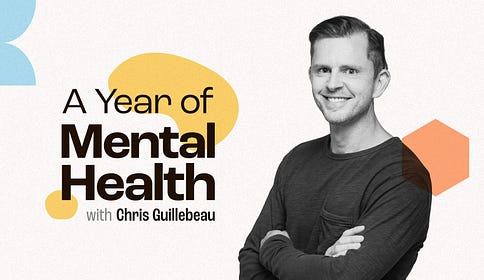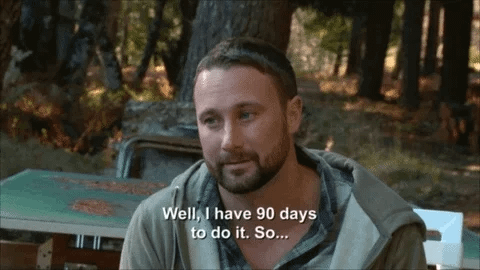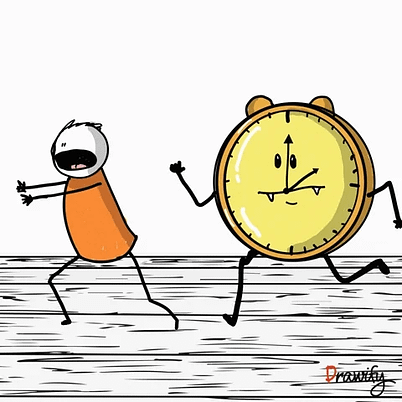Procrastination is the worst, right? I was going to write a post about it, but then decided to put it off until tomorrow. Just kidding, I wrote it today—but there’s a twist. Sometimes, procrastination can be both helpful and useful! Also, in case you missed it: A Year of Mental Health is now 100% free to everyone! I still (very much) appreciate our paid subscribers who make this possible. Here’s a special offer to upgrade if you’re able: Don't “Eat the Frog,” Practice Structured Procrastination InsteadHow procrastination can actually be helpful and useful.Most of us struggle with procrastination from time to time—or perhaps “constantly.” Doing things we don’t want to is hard! And there’s no doubt that sometimes, the only way out is through. One tool that helps me is making a to-dread list, which is exactly as it sounds: it’s a list of things I am really putting off but should probably pay attention to. But like all such tools and habits, there are exceptions. Many of us get into negative patterns of thinking (cognitive distortions, technically) that don’t serve us well. One of them is the belief that procrastination is inherently evil and that we “must” always charge forward on those tasks we’d like to defer. But then, of course, we aren’t always able to psyche ourselves up / push through / choose your preferred metaphor to overcome procrastination—and then we just end up feeling worse. This is a big problem with most productivity methods, which don’t account for cognitive distortions and the fact that not everyone thinks neurotypically.Fortunately, there is another way! 🦸🏼♀️ It’s called structured procrastination, and the concept originated back in 1995 by John Perry, a professor of philosophy at Stanford.¹ In a nutshell, structured procrastination is a technique where you intentionally put off the most daunting tasks by focusing on less urgent but still important activities. Instead of tackling the biggest, most stressful assignment first, you work on smaller, manageable tasks that are also productive. For example, if you have a major paper due, you might start by doing other assignments, organizing your study space, or even working on a different project. This way, you stay in focus mode and gradually reduce the overall workload, making the big task feel less overwhelming when you finally get to it. It leverages the natural tendency to procrastinate by turning it into a working strategy. Or as I think of it: When you can’t do the big things that are on your mind, sometimes it’s okay to do other things that also need doing at some point. I know, this is counter to what you may have been told—which is the whole point. Stay tuned, we’ll get back to the concern. Examples? Sure! Try These.Work Projects: You have a major report due next week. Instead of starting with the complex analysis, you begin by formatting the document, creating the title page, and writing the introduction. By the time you finish these easier tasks, you’ve made progress and feel more prepared to tackle the harder sections. Household Chores: Your entire house needs a deep clean. Instead of getting overwhelmed by the thought of cleaning every room, you start by tidying up one area, like the kitchen counter or couch. Then, you might do a load of laundry or organize a drawer. Each small task makes the overall cleaning process feel more manageable. Financial Planning: You need to organize your finances and make some big decisions. Instead of diving straight into the complex task of budgeting, you start by gathering all your financial documents and receipts. Next, you categorize your expenses. Over time, the bigger task of organization becomes less intimidating. Fitness Goals: You want to start a new exercise routine, but the thought of a full workout is daunting. Instead, you start by taking short walks, stretching, or doing light exercises at home. Gradually, you build up to more intense workouts as your confidence and habit strength grow. (Side note: 15-minute workouts are great! If you exercise 15 minutes a day, that’s way better than not exercising at all.) Meal Planning: You need to plan meals for the week but feel overwhelmed by the process. Start by making a list of your favorite easy recipes. Then, create a grocery list for those meals. Finally, you might prep a few ingredients in advance, like chopping vegetables. This way, meal planning feels less overwhelming and more achievable. Again, this perspective runs counter to traditional advice about procrastination, i.e. that you should just face the big thing first, get over it, and “eat the frog” before doing anything else. Which reminds me! So far this year, at least a dozen or more readers have commented something about how this advice does not work for them. Maybe it’s a good reminder that productivity advice is NOT one-size fits all, and also that those of us who are neurodivergent just operate differently. Besides, who likes eating frogs? Instead of eating them, sometimes you can just leave them alone for a while and do something else. Structured procrastination is about organizing your tasks in a way that uses the tendency to procrastinate to your advantage. What are you avoiding? Facing it is one option—but so is “taking that energy and applying it somewhere more useful.” You’re currently a free subscriber to 🌻 A Year of Mental Health. For the full experience, consider upgrading! |
Don't “Eat the Frog,” Practice Structured Procrastination Instead
June 26, 2024
Ticker
6/recent/ticker-posts
Labels
[New post] Trinity pupil named as prize-winner in Young Poets awards
November 08, 2022
[New post] Christmas Fundraising Quiz night, South Norwood, Dec 6
November 08, 2022
Saying No
February 07, 2025
PDP-Laban banking on May polls to save Sara
February 07, 2025
Elon Spotted at Weird Facility in Memphis
February 07, 2025
This Electric Boating Stock Has Potential To Soar
February 10, 2025
"Elon’s #1 AI Stock” SET TO SOAR
February 09, 2025
Shocking footage from Bill Gates’ $100,000,000,000 AI Bet
February 09, 2025
House targets VP's bank records for impeachment trial
February 10, 2025
Random Posts
3/random/post-list
Recent in Sports
3/à¦ূগোল%20প্রশ্ন%20ও%20উত্তর/post-list
Popular Posts
[New post] Trinity pupil named as prize-winner in Young Poets awards
November 08, 2022
[New post] Christmas Fundraising Quiz night, South Norwood, Dec 6
November 08, 2022
Menu Footer Widget
Copyright © - StudyNoteGuru All Right Reserved





0 Comments